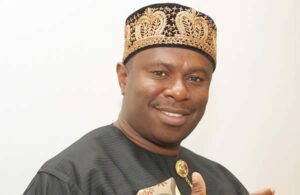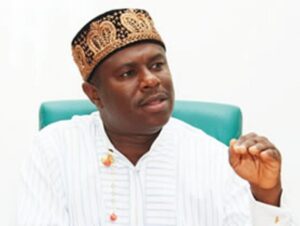
Cholera in hard times
By Dakuku Peterside
Yemen, a West Asian country in the Arabian Peninsula, reported one million cases of cholera in March 2018. The world shook. At that time, Yemen was in a civil war, leading to the Stockholm Agreement between feuding parties. The cholera outbreak in Yemen was linked to conflict, lack of access to clean water, extreme poverty, and the collapse of the health system. An unholy marriage of a conflict and an infectious disease outbreak can render people and health systems powerless and defenceless. Compared to Yemen, Nigeria was recovering from COVID-19 in 2021 when it experienced cholera outbreaks in 29 out of 36 states, affecting 111,062 people. Key drivers of the 2021 cholera outbreak in Nigeria were flooding, poor health facilities, lack of access to clean water, reduced hygiene, and poverty, some of which are persistent challenges in Nigeria’s development equation.
As of 2023, Nigeria has reported over 60,000 suspected cholera cases, resulting in several hundred deaths. The outbreak has affected multiple states, with the North bearing the highest burden. By mid-2024, Nigeria is still grappling with cholera outbreaks. While Nigeria is not in a civil war like Yemen and is not experiencing flooding in 29 states, the country is dealing with cholera outbreaks of alarming proportions. Following a dynamic risk assessment, the Nigeria Centre for Disease Control (NCDC) has activated its emergency centre as the death toll from the recent cholera outbreak, prevalent in 31 states, reached 53 nationwide. The situation is urgent and requires immediate attention.
Cholera is a severe diarrheal disease caused by the bacterium Vibrio cholerae, which can lead to dehydration and death if not promptly treated. Nigeria has faced recurring cholera outbreaks, often exacerbated by conflicts, displacement, and natural disasters. A multitude of factors contributes to the persistence and severity of these outbreaks.
Firstly, conflict and displacement exacerbate the issue. Ongoing conflicts, particularly in the Northeast region, have displaced millions. Internally Displaced Persons (IDP) camps often lack proper sanitation facilities and clean water, creating ideal conditions for cholera to spread. Secondly, the rainy season (usually from May to October) frequently leads to flooding, contaminating water sources and increasing the risk of cholera. Flood-prone areas and communities living along riverbanks are particularly vulnerable. Thirdly, while urban areas might have better healthcare infrastructure, rural communities often lack healthcare, clean water, and sanitation infrastructure. This disparity increases the disease’s impact in less accessible regions. Fourthly, Nigeria’s healthcare system faces significant challenges, including limited resources, inadequate infrastructure, and shortages of medical supplies and personnel. During outbreaks, these weaknesses hinder effective response and treatment.
The current cholera outbreak situation approaches emergency dimensions because the infection is spreading during an economically and socially challenging time for the nation. Hard times and infectious diseases are a devastating combination, making people more susceptible to infections. The poorest and most deprived are the most vulnerable. The challenge of hunger, malnutrition, lack of access to potable water, inability to pay for essential food items, and dearth of healthcare facilities is real in Nigeria. Unfortunately, our governors and federal government officials are engrossed in constructing roads and bridges that only the living can use. Somehow, we are deaf to the cries of poverty and hunger all around us. We only hear the sirens of politicians and the elite . Fighting epidemics like cholera and Lassa fever is not a priority.
NCDC has been outstanding in its work. The agency has consistently demonstrated what a proactive and functional government department can achieve. We are also fortunate to have two ministers of health who have the clarity and determination to tackle the most complex challenges. However, fighting an epidemic requires addressing the social conditions that make people vulnerable. Hunger and poverty are health hazards in themselves.
Current efforts in affected areas are primarily focused on seeking medical solutions rather than a combined approach. If people continue to consume unhygienic food and water, the risk of infections increasing to epidemic proportions and disease strains becoming more resistant is high. A combination of vaccination, access to potable water, food security, improved hygiene, enhanced nutritional value, and extensive public awareness is necessary. We must combat this cholera outbreak as if it were a war. Each of us has a role to play in this fight, from maintaining personal hygiene to advocating for better public health policies.
Some states have been proactive and exemplary. Under former Governor Dave Umahi, Ebonyi maintained a high vaccination rate, and the current Governor, Francis Nwifuru, has elevated vaccination efforts. States like Akwa Ibom, Enugu, Nasarawa, Niger, and Rivers have prioritised the health of their people over petty political considerations. Jigawa State, according to UNICEF and the Federal Ministry of Health, was declared the first open defecation-free state in Nigeria. This is a plus in the fight against cholera. Lagos has been exemplary in public health education . Their efforts are inspiring and demonstrate that change is possible. The Niger Delta Development Commission (NDDC) has also intervened significantly by providing cholera vaccines for nine states, in addition to offering free medical




